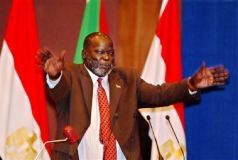Garang death a great loss to Sudan
NAIROBI, Aug 1, 2005 — Women wailed and men cried silently as news reached exiles of the death of former southern Sudanese rebel leader John Garang.
 Garang’s January peace deal with the government he had fought had raised hopes of returning home among the thousands of southern Sudanese living in Kenya, where Garang’s Sudan People’s Liberation Movement had long been based. Monday, grief and uncertainty vied with that hope –among leaders in the region as well as among the Sudanese.
Garang’s January peace deal with the government he had fought had raised hopes of returning home among the thousands of southern Sudanese living in Kenya, where Garang’s Sudan People’s Liberation Movement had long been based. Monday, grief and uncertainty vied with that hope –among leaders in the region as well as among the Sudanese.
Garang, 60, died when his helicopter crashed into a southern mountain range in bad weather after taking off from Uganda, where he had been on a private visit. Missing since Saturday, his body was found in the wreckage early Monday.
“I call upon all members of the SPLM and the entire Sudanese nation to remain calm and vigilant,” Garang’s longtime deputy, Salva Kiir, told reporters in Nairobi, adding he was on his way to an emergency meeting he had called of the Sudan People’s Liberation Movement’s top decision-making body. Kiir later flew to Sudan.
Kiir was quickly named to succeed Garang as head of his movement and as president of south Sudan, Garang spokesman Yasser Arman told The Associated Press in Nairobi, Kenya. Arman indicated Kiir would also take Garang’s post as first vice president in the national government, but there was no immediate confirmation from Khartoum.
Garang had been named vice president under the peace agreement, which also promised the south a share of power, a say in exploiting its resources and a promise of democratic elections. The settlement allowed Garang to set up an interim administration in the south until a referendum in six years’ time on secession.
In Nairobi Monday, wailing mourners gathered outside his movement’s headquarters. Groups of southern Sudanese men huddled on Nairobi’s main street, Kenyatta Avenue, discussing Garang’s death. But there was none of the violence that broke out in the Sudanese capital, Khartoum.
In Nairobi, Atem Maper, 30, said that younger exiles were suspicious of the circumstances surrounding Garang’s death.
“People are worried that the war will continue,” Maper said. “They didn’t understand the way he died. We are going to see.”
Kenyan President Mwai Kibaki said Garang had been key to the peace, but expressed “hope and optimism that every effort will be taken to ensure that the physical absence of Dr. Garang will not in any way jeopardize the gains made towards durable peace.”
Kibaki ordered the Kenyan flag flown at half staff for the next three days in honor of Garang, whom he praised as patient, energetic and skilled negotiator ready to make sacrifices.
The chief mediator during the negotiations that ended 21 years of war, retired Kenyan Gen. Lazaro Sumbeiywo, said that Garang’s death could hurt the January peace agreement, but he said that he was confident Sudan’s leaders can overcome this, particularly with the support of the international community.
“The agreement will suffer,” Sumbeiywo told journalists. “It will suffer because of the person of John. Dr. John Garang was a special person. He was a very focussed, very solid man, who knew exactly what he wanted for the Sudan.”
Sumbeiywo added he was sure there was no foul play in Garang’s death, saying Garang was in an area he controlled at the time of the crash.
Ahmed Aboul Gheit, Egypt’s foreign minister, called on all parties in Sudan to pursue the peace “Garang was working toward.” Jordanian deputy prime minister and government spokesman, Marwan al-Muasher, expressed Jordan’s condolences. Arabs, particularly neighboring Egypt with its history of intervening in Sudan, had closely watched the Sudanese peace process, fearful of the possibility an Arab neighbor could be split.
John Duom, 67, an SPLM official who had known Garang since childhood, compared him to Moses.
“He has shown us the direction to follow,” said Duom, wiping tears from his eyes. “We wish God had spared his life until after six years, after the referendum.”
(AP/ST)
